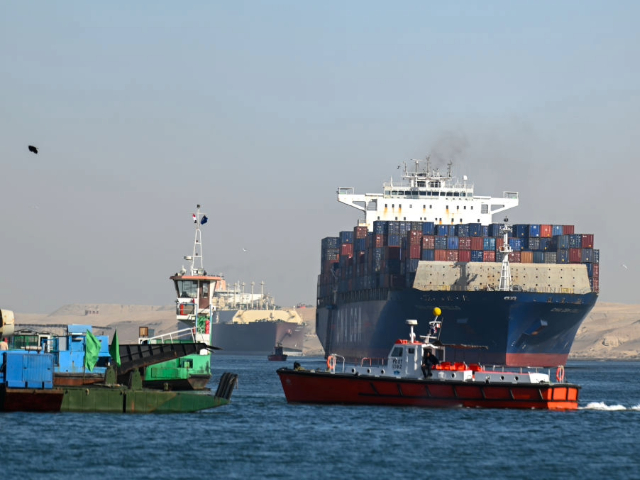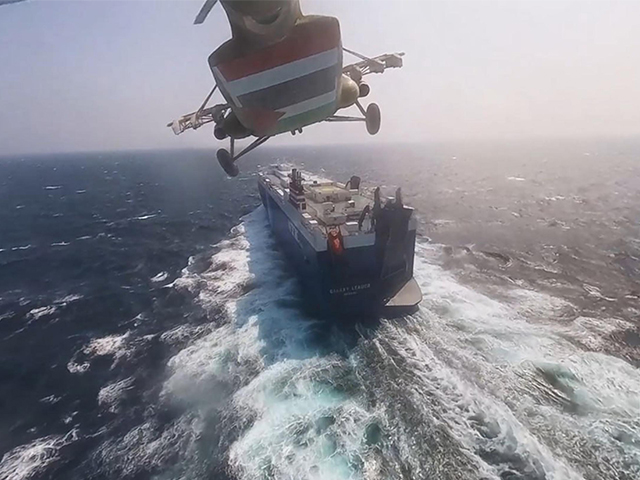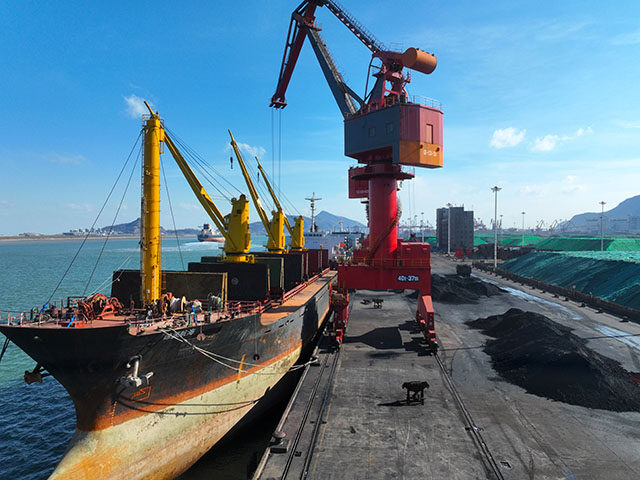The South China Morning Post (SCMP) reported Monday that, contrary to blithe assurances from the Chinese government that everything is under control, export companies are frantically seeking “Plan B” options to cope with rising shipping costs due to terrorist attacks in the Red Sea by the Iran-backed Houthis of Yemen.
The SCMP report followed rumblings from analysts that China’s massive export sector includes a large number of businesses with very thin profit margins whose entire business plans are based on fast, cheap shipping to Europe via the Suez Canal.
RELATED VIDEO — Biden Co-Chair: “No Surprise” We Haven’t Deterred Houthis Yet:
According to the SCMP, 40-foot shipping containers are now selling for $5,400, a massive increase from just $1,500 a week ago. The volume of cargo traffic through the Suez Canal is down by 30 percent for cargo and 19 percent for tankers due to Houthi attacks.
Researcher Pan Guang of the Shanghai Academy of Social Sciences noted that not only are Chinese export companies unable to cope with 300- to 400-percent surges in the cost of shipping, but China’s massive Belt and Road Initiative (BRI) is heavily dependent upon the Red Sea route for transferring supplies to construction projects in the Middle East.
Pan said it should not be “just a responsibility to be shouldered by one single country to keep smooth and safe international shipping ways,” a strong hint that China should do more to contain the Houthi menace.

A ship transits the Suez Canal towards the Red Sea on January 10, 2024 in Ismailia, Egypt. (Sayed Hassan/Getty Images)
The single country Pan was obliquely referring to was the United States, although he really meant two countries, as the United Kingdom has also been intercepting Houthi drones and bombing missile sites along the coast of Yemen. The U.S. and UK conducted another such bombing mission on Tuesday.
A spokesman for the Chinese Ministry of Commerce said Beijing wants a “joint effort” to restore security to the Red Sea shipping lanes but did not say exactly what China was prepared to do against the Houthis, who have sworn to continue their campaign of piracy for as long as Israel fights the terrorists of Hamas in Gaza.
WATCH — Pentagon: “No Indications” Houthis Will Stop Attacking:
So far, every Plan B alternative to Red Sea shipping has involved either sky-high costs, long delays, or heavy risks – as in the case of China’s vaunted cross-continental railroads, which run perilously close to the Russia-Ukraine combat zone.
The heavy shipping season of the Lunar New Year holiday is an immediate concern, as it would have raised shipping costs even without the Houthi threat, but some analysts hinted the long-term picture after Lunar New Year could be the real problem as business models are sorely stressed, inventories run low, and profits evaporate.
The Washington Post reported on Saturday that the Biden administration is “crafting plans for a sustained military campaign” against the Houthis, since ten days of limited strikes failed to degrade their ability to menace the Red Sea.

This handout screen grab captured from a video shows Yemen’s Houthi fighters’ takeover of the Galaxy Leader Cargo in the Red Sea coast off Hudaydah, on November 20, 2023, in the Red Sea, Yemen. (Houthi Movement via Getty Images)
According to the Washington Post’s sources, the administration has been extremely reluctant to escalate or expand the Gaza conflict, but the pressure on global shipping – and the likelihood that higher shipping costs will soon cause inflation to explode again, angering voters – is so great that the effort against the Houthis must be taken up a notch:
Administration officials, speaking on the condition of anonymity to discuss internal deliberations, described their strategy in Yemen as an effort to erode the Houthis’ high-level military capability enough to curtail their ability to target shipping in the Red Sea and Gulf of Aden or, at a minimum, to provide a sufficient deterrent so that risk-averse shipping companies will resume sending vessels through the region’s waterways.
“We are clear-eyed about who the Houthis are, and their worldview,” a senior U.S. official said of the group, which the Biden administration designated this week as a terrorist organization. “So we’re not sure that they’re going to stop immediately, but we are certainly trying to degrade and destroy their capabilities.”
Biden administration officials ominously told the Washington Post they cannot pinpoint an “end date” for the anti-Houthi operation or “provide an estimate for when the Yemenis’ military capability will be adequately diminished,” but they did not expect the operation to “stretch on for years like previous U.S. wars in Iraq, Afghanistan, or Syria.”
“We’re not trying to defeat the Houthis. There’s no appetite for invading Yemen,” one of the officials said.

COMMENTS
Please let us know if you're having issues with commenting.